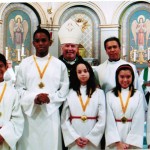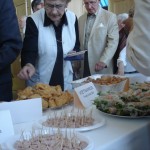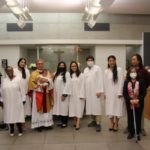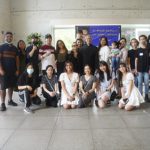Did you ever notice when you see pictures of Moslems praying in a giant Mosque you see only men. Women are surely there too but in a separate section. Orthodox Jews have separate worship spaces for men and women. This practice goes back for centuries in the Middle East. It was the same in the time of Jesus. It’s what he was used to; it was way things were done.
Probably when Jesus and his friends dropped in on Lazarus and Mary and Martha it was just expected that Lazarus would sit with the men and listen to what Jesus had to say and probably ask questions and discuss things. Mary and Martha would carry on as usual, preparing the meal.
Mary decides to join the men and be part of their conversation. Probably Lazarus was embarrassed by Mary’s brazen behavior and the rest were probably uneasy with Mary being where she just didn’t belong, even though it was her home.
It didn’t seem to bother Jesus in the least. When the over wrought Maratha complains about the unfairness of it all, herself doing all the work, she gets no support from Jesus. So often Jesus has upset the apple cart by not buying into what the culture expectations of people. It’s almost like he’s saying, ‘Martha, chill out and join the conversation.’ You might learn something.
Jesus would not confine Mary to the limitations put on her by the culture of her time. He supported her attempt to break the mold.
How often do we stereotype men and women? Remember a song our years ago called ‘Little Boxes’? There’s a green one and a pink one and a blue one and a yellow on and they’re all make out of ticky tacky and the all look just the same.
Don’t we have a tendency to box people in because of racial origins, skin color, religious background, social standing or sexual orientation? We put them in little boxes and in so doing we limit them to our limited opinions and expectations of them.
Men and women wearing clothes native to their homeland or expressive of their religious beliefs we chalk up as different, strange, and maybe even dangerous. A young black man driving an expensive car is carded, just to be safe, just to keep an eye on him. Black youths walking in a neighbourhood where they don’t seem to belong, we see as a sign of trouble. There can be so many ways we, even unconsciously, box people in, maybe not even giving it a second thought. We diminish them in our own minds. We may not even think of it but we dehumanize them. In our own mind we make them less than they are, we deny them their human worth and dignity as sons and daughters of our common Father. We rob ourselves of the opportunity to discover the goodness and kindness of these good people.
Today’s Scriptures are about hospitality; Abraham welcoming three strangers, Lazarus, Mary and Martha welcoming Jesus and some disciples into their home. St. Paul tells us, ‘Do not neglect to show hospitality to strangers, for by doing so some have entertained angels without knowing it.’ Being open minded, accepting of men and women different from ourselves we image the hospitality of Jesus to each of us when he said, ‘Come to me all you who labor and find life difficult and I will refresh you’. Such open mindedness would bring us closer to living the difficult command of Jesus, ‘love one another as I have loved you.’
God grant us the gift to be open minded and open hearted toward all those who come into our lives.
 Founded by St. Paul of the Cross, every Passionist takes a special vow to spend his or her energies in promoting remembrance of the sufferings of Jesus, the memory of the Cross, and reflection of the meaning of the Cross for the world.
Founded by St. Paul of the Cross, every Passionist takes a special vow to spend his or her energies in promoting remembrance of the sufferings of Jesus, the memory of the Cross, and reflection of the meaning of the Cross for the world.




